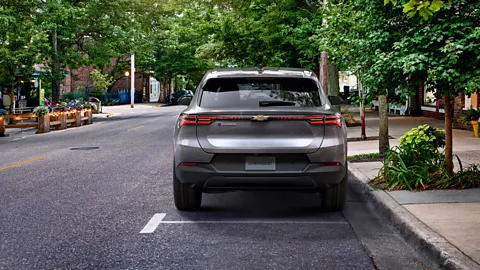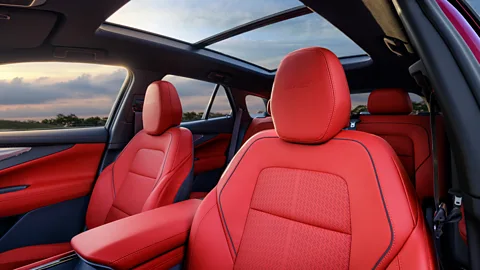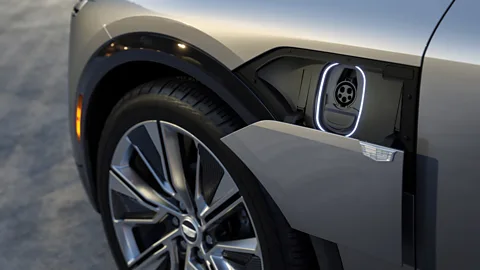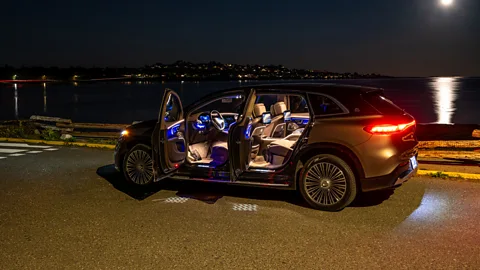The EV SUVs consumers want are coming
 Courtesy of Chevrolet
Courtesy of ChevroletOne of the main reasons keeping American drivers from going electric is that cars are too small. They want size and luxury – and auto companies are delivering.
Americans love their SUVs. Both industry experts and consumers say one of the top reasons US drivers haven't made the switch to EVs is the lack of comparable electric models.
Drivers want an EV SUV that matches the rich features of their gas guzzlers – size, performance and style – but the pickings are slim, says EY partner and American automotive eMobility leader Felipe Smolka. "High initial costs and concerns about range have been major barriers, particularly when juxtaposed with well-established gasoline-powered SUVs, which offer reliability and a broad range of options," he says.
But this year, that will change. Auto companies are preparing dozens of all-electric SUVs for the US market, from luxurious three-row vehicles that can carry football teams to practice, to mini-SUVs with an affordable price tag. These new vehicles could tear down some of the major barriers to EV adoption like price, range and variety.
 Courtesy of Chevrolet
Courtesy of ChevroletAt the Consumer Electronics Show in Las Vegas in January, newcomer VinFast, owned by Vietnam's largest conglomerate VinGroup, revealed more details about its mini VF3 SUV coming to the US market with a relatively tiny price to match – likely sub-$20,000 (£15,780) – which after rebate could make it one of the most affordable cars in the US. Tesla is also offering a smaller, more affordable offering in its Model Y – a compact SUV with a base price of $44,000 (£34,640).
Chinese auto company Nio, which set up shop in California's Silicon Valley last year, has plans to enter the US market by 2025 with a luxury six-seater SUV, Nio ES8. While its base price of around $70,000 (£55,150) puts it on the more expensive end of the spectrum, it includes luxury features, including massage seats, fast charge and integrated AI assistant, Nomi, that put it into a class with much pricier SUVs like Tesla's Model X.
China has an advantage in the EV market, where government subsidies and access to more than half the world's supply of lithium make it possible for the country to produce new models – including SUVs – at a lower price point.
 Courtesy of Cadillac
Courtesy of CadillacSome American companies, however – particularly California-based EV makers including Rivian, Lucid Motors and Fisker – made the decision to prioritise all-electric SUVs over other models early on.
Henrik Fisker, CEO of the eponymous brand, says consumers are willing to test out these new companies to get the aesthetics they want. "We have seen people coming from other car brands," he says. "So, that means people like that we have a real awesome-looking SUV, because some of the new electric cars look more like hatchbacks."
At CES, Fisker showcased its Ocean model, which includes seating for five. They also have a subcompact SUV announced for 2025 named Pear that starts at $29,900 (£23,558).
In addition to price and variety, the US market has made it clear that they want EVs with at least a 300-mile (483km) range. Car makers have heeded the call. Tesla's line-up includes its best-selling Model X, a luxury mid-size crossover SUV with a battery range of 326 miles. Many of the newer generation of electric SUVs have similarly long ranges including models from the Big Three automakers.
 Courtesy of Mercedes-Benz
Courtesy of Mercedes-BenzMany industry experts believe this consumer desire for ever greater battery range has more to do with short-term anxiety about lack of charging infrastructure, and less to do with a real need for such performance.
"Most consumers do not actually drive as much as they think they do," says Achyut Jajoo, senior vice president and general manager of manufacturing and automotive at Salesforce. "You do not really need 300 miles of range on a daily basis. What you need is maybe 50 or 70 miles of range." He explains that as the public charging infrastructure is built out, the demand for long-range EV SUVs may taper off. For now, however, range is a critical selling point.
As SUVs sales in the US grow, the influx of electric vehicles in this segment bodes well for EV adoption throughout the next few years, particularly as competition drives prices down and charging options improve.
